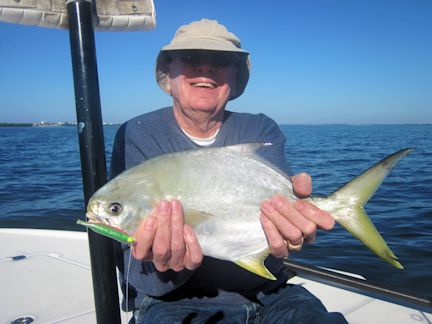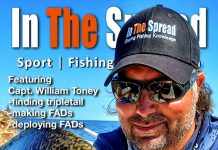Capt. Rick Grassett’s Sarasota, FL Fly Fishing Forecast for February 2019
Trout and redfish should be good shallow water options this month. You may also find trout along with blues, Spanish mackerel, pompano and flounder on deep grass flats. Look for sheepshead, flounder, reds and more around docks. Catch and release night snook fishing around lighted docks in the ICW may be a good option if it’s not too cold. Spanish mackerel, king mackerel and cobia may show up in the coastal gulf by the end of the month depending on conditions.
Snook and reds remain closed on the west coast of Florida. The Florida FWC has enacted a temporary modification of regulations for reds and snook, in the areas affected by the recent red tide. The area extends from Pasco County, south to the south bank of Gordon Pass in Collier County. Reds and snook are catch and release only in that zone until May 10, 2019. Full details including exact boundaries can be found at http://myfwc.com/news/news-releases/2018/september/26/comm-red-tide/ .
Since snook are temperature sensitive, I won’t target them following strong fronts when water temperatures dip below 60 degrees. However, I have had some great night trips catching and releasing snook on flies in the ICW at night this time of year. Since larger baitfish aren’t that plentiful this time of year, snook will gorge themselves on glass minnows and shrimp. Small white flies, like my Grassett Snook Minnow, Grassett Shrimp or Shrimp Gurglers will all work well.
You may also find snook in rivers, creeks or canals this month. Fishing may be good in these areas on a blustery day when it isn’t fit to fish anywhere else. I like wider profile flies in these areas due to the baitfish that may be found there. Fly anglers should score with baitfish patterns, such as Lefty’s Deceiver, EP flies or my Grassett Deep Flats Bunny, fished on a sink tip fly line. Fish the deep spots, usually in bends in the river, for the best action.
You might find reds in potholes or along the edges of bars and shallow flats when the tide is low. As the tide rises, they will feed higher on shallow flats, particularly on sunny afternoons. Fly anglers should score with lightly weighted flies with weed guards on floating lines with 10’-12’ leaders. My Grassett Flats Minnow fly is my “go to” fly for fishing skinny water. You may also find big trout in skinny water in the same places you find reds. The same flies and techniques that you use to target reds will work for big trout in those areas. I release all trout over 20” since they are usually females and I feel that they are important to the health of our trout fishery. Big fish, spawn big fish!
You’ll also find trout on deep grass flats and silver trout may mix with them on deep grass flats close to passes. I like flats that have a good mix of grass and sand and good tidal flow. Flats that are close to passes are often good choices unless the water is dirty. Following fronts, silted up water will cover deep grass flats close to passes, often affecting fishing in those areas. I like to drift and cast ahead of my drift with weighted flies, like my Grassett Deep Flats Bunny or Ultra Hair Clouser flies, on sink tip fly lines to locate trout. Once you’ve located them you can shorten your drift or anchor on them.
In addition to trout, you may also find blues, Spanish mackerel, flounder or pompano, depending on water temperature and conditions, on deep grass flats. The technique to find them is the same as for trout, although there may be other clues. Pompano may “skip” on the surface when you drift or run past them giving their presence away. When that happens, set up a drift upwind of where you saw a pompano and cast ahead of your drift. Blues and Spanish mackerel may force bait out of the water or feed on the surface. You may need to add heavy fluorocarbon or wire when blues and mackerel are mixed with trout on deep grass flats. I like to use Ultra Hair Clouser flies, tied on long shank hooks leaving a portion of the hook shank exposed as a bite guard, when toothy fish are around.
Fishing docks is another good option this time of year, especially when the tide is low. You might find reds, sheepshead or flounder under docks. I like docks that are deep (3’ or more) and have a good tidal flow. Fish the end of long piers to find the deepest water. Also, look for big boats moored on docks or on boat lifts, which is also an indication of deeper water. Older docks with lots of barnacle and oyster growth usually hold more baitfish and predators. I like weighted flies, like Clousers, fished on sink tip fly lines when fishing docks. Be sure to let your fly get down close to the bottom and strip with a distinct pause to keep it low in the water column.
There may be some action in the coastal gulf by the end of the month with Spanish mackerel, king mackerel and cobia depending on conditions. When the water warms to the high 60’s to low 70’s, these fish will move into our area from the south as they migrate north. Look for Spanish mackerel on the surface or in passes. Cobia may be swimming on the surface, around buoys, channel markers and crab trap floats or over structure.
February can be a tough month to fish. With frequent fronts and cool water, fish aren’t always in an eating mood. If you’re able to pick good tides combined with favorable weather conditions, you should be successful. If you don’t have that luxury, you might do better by sleeping in and fishing later in the day when it’s warmer. Our natural resources are under constant pressure from red tides fueled by agricultural and residential runoff, freezes, increasing fishing pressure and habitat loss and degradation, please limit your kill, don’t kill your limit!
Tight Lines,
Capt. Rick Grassett
FFI Certified Fly Casting Instructor
Orvis-Endorsed Fly Fishing Guide at CB’s Saltwater Outfitters
Orvis Outfitter of the Year-2011
Snook Fin-Addict Guide Service, Inc.
www.snookfin-addict.com, www.snookfinaddict.com and www.flyfishingflorida.us
E-mail snookfin@aol.com
(941) 923-7799 (office)
Latest posts by Capt. Rick Grassett (see all)
- Sarasota, Rick Grassett - March 12, 2024
- Grasssett Fly March - March 3, 2024
- Grassett March - March 3, 2024











